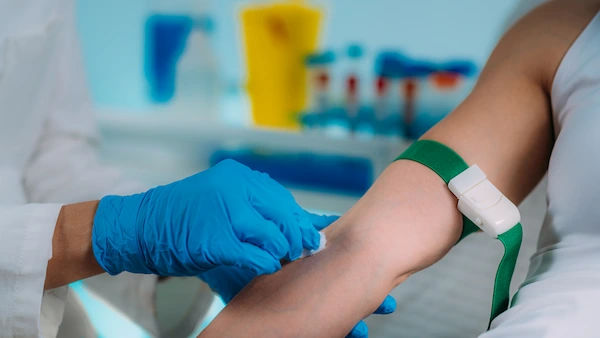Muscle Cramps in Kids: Could an Electrolyte Imbalance Be the Cause?
Explore the link between muscle cramps in kids and possible electrolyte imbalances. Learn the signs, causes, and when to consult a doctor for proper diagnosis and treatment.

Written by Dr. Shaik Abdul Kalam
Reviewed by Dr. J T Hema Pratima MBBS, Fellowship in Diabetes Mellitus
Last updated on 10th Sep, 2025

For many parents, it can be upsetting to see their child suddenly stop, grab their leg, or wince in pain from a muscle cramp. While these cramps are often brief and harmless, frequent or unexplained episodes can leave you feeling concerned and unsure of what’s really going on. In active kids, cramps are often chalked up to growth spurts or just overdoing it during play or sports. But what if there's something more going on beneath the surface?
This article will help you understand how an electrolyte imbalance, a condition that’s more common in children than many people think, could be playing a role in your child’s muscle cramps. Our goal is to give you the knowledge and confidence to recognise when a simple blood test might help uncover the cause. We’ll break down what electrolytes are, why they’re so important for your child’s body, and how diagnostic testing can offer real answers and relief.
The ABCs of Electrolytes: The Body's Electrical Conductors
To understand why an electrolyte imbalance can cause muscle cramps, you first need to know what electrolytes are and what they do. Simply put, electrolytes are essential minerals that carry an electric charge when dissolved in body fluids like blood and urine. Think of them as the body's electrical conductors. They play a critical role in numerous bodily functions, including:
- Muscle Contraction and Nerve Function: Electrolytes like sodium, potassium, and calcium are essential for transmitting nerve signals that tell muscles when to contract and relax. An imbalance can disrupt this process, leading to involuntary contractions, or cramps.
- Hydration and Fluid Balance: Electrolytes help regulate the amount of water in and around the cells. Proper fluid balance is vital for everything from maintaining blood pressure to preventing dehydration, which is a common trigger for cramps.
- Heartbeat Regulation: Potassium is particularly crucial for a healthy heart rhythm. Imbalances can affect the heart's electrical system, which is why severe electrolyte disturbances can be dangerous.
- When it comes to muscle function, three key electrolytes take centre stage: sodium, potassium, and calcium. Magnesium is also important and is usually included when doctors assess a child’s electrolyte levels. These minerals help muscles contract and relax properly, so when they're out of balance, muscle cramps can be one of the first signs something's off.
Why Kids Are More Likely to Have Electrolyte Imbalances?
Children, especially those who are always on the move, can be more prone to electrolyte imbalances for a few important reasons:
They burn energy faster: Kids have a naturally higher metabolism, which means they heat up more quickly during physical activity. This leads to more sweating, and with it, a greater loss of vital electrolytes.
- Their diets aren’t always ideal: Many children prefer processed snacks or sugary drinks over healthier options like fruits, vegetables, and dairy foods that are rich in electrolytes. This can lead to low levels of key minerals over time.
- They're growing fast: During growth spurts, the body demands more minerals like calcium and magnesium to support bone and muscle development. If these needs aren’t met through diet, symptoms like cramps may appear.
- They don’t always hydrate properly: Kids may not realise they’re thirsty or may be too distracted during play to drink enough water. Dehydration is one of the most common reasons behind low electrolyte levels.
- While most muscle cramps in kids are harmless and linked to things like overexertion, dehydration, or lack of stretching, frequent or severe cramps, especially if they happen at night or without a clear reason, deserve attention. In these cases, a simple blood test can help uncover whether an electrolyte imbalance is the hidden cause, making it easier to treat and prevent further discomfort.
Finding the Root Cause
If your child is having frequent muscle cramps, the first step is usually a visit to the doctor. They’ll start by asking questions about your child’s symptoms, daily routine, diet, and how active they are. A physical examination may follow to check for any obvious issues.
If no clear cause shows up right away, the doctor might recommend some blood tests to dig a little deeper. The most important tests in this situation are:
- Electrolytes - Serum Test: This is the primary blood test for assessing electrolyte levels. It measures the concentrations of sodium, potassium, and chloride in the blood. These three electrolytes are fundamental for muscle and nerve function, and a simple imbalance in any of them can be the culprit. A sodium imbalance can be a sign of dehydration or overhydration, while potassium levels are critical for muscle contraction and heart rhythm.
Book Electrolytes Serum Test Here
- Electrolytes with Calcium Test: Because calcium is also a key player in muscle contraction, a test that includes calcium alongside the primary electrolytes is often recommended. This test provides a more comprehensive view of the mineral balance essential for both muscle and bone health. A deficiency in calcium, known as hypocalcaemia, can be a direct cause of muscle cramps and spasms.
Book Electrolytes with Calcium Test Here
- Comprehensive Health Packages: Sometimes, muscle cramps in children can be linked to other health issues like thyroid problems or kidney function. To rule out these possibilities, your doctor might suggest a more thorough check-up. That’s where comprehensive health packages come in. These packages include a wide range of tests, including an electrolyte panel to give a complete picture of your child’s overall health.
Benefits of Diagnostic Testing
Getting a blood test for your child might feel intimidating, but it’s a smart step toward understanding their health. Here’s why checking electrolyte levels can really help:
- Clear Diagnosis: It removes the guesswork and helps doctors pinpoint the exact cause of cramps.
- Focused Treatment: If there’s an imbalance, treatment can be as simple as tweaking their diet or adding supplements.
- Peace of Mind: Normal results rule out serious issues, while early signs of a problem can be caught and managed.
- Prevention: It helps you make better long-term choices—like keeping your child well-hydrated and ensuring a balanced diet.
Booking Your Child’s Electrolyte Test with Apollo 24|7
Apollo 24|7 makes booking a lab test for your child convenient and stress-free. Here's a simple, step-by-step guide:
- Visit the Website: Go to the main lab tests page on the Apollo 24|7 website.
- Search for the Test: Use the search or click the link to find the specific test your doctor recommended, like "Electrolytes - Serum" or "Electrolytes with Calcium."
- Book Home Collection: Select the test and choose the home sample collection service. A certified phlebotomist will visit your home at a scheduled time, making the process more comfortable for your child.
- Finalise Booking: Complete your details and payment. You will receive a booking confirmation with the appointment time.
- Access Reports Online: Once the results are ready, you can download them from the Apollo 24|7 app or website to share with your child's doctor.
- The home collection service ensures a safe and comfortable experience, while Apollo Diagnostics' reputation guarantees reliable results, giving you complete confidence.
Get Your Health Assessed Here
Conclusion
While muscle cramps in children are often a part of a healthy, active lifestyle, they should not be a cause for silent worry. If your child is experiencing frequent or unexplained cramps, exploring the possibility of an electrolyte imbalance through a simple blood test is a wise and proactive step. The information gained from a test, such as the Electrolytes - Serum test or a more comprehensive package, can provide clear answers, guide effective treatment, and give you the peace of mind that comes with knowing you have taken the best possible care of your child's health. With convenient and reliable services from providers like Apollo 24|7, diagnostic testing is more accessible than ever, putting the power of informed decision-making firmly in your hands.



.webp)

.webp)
